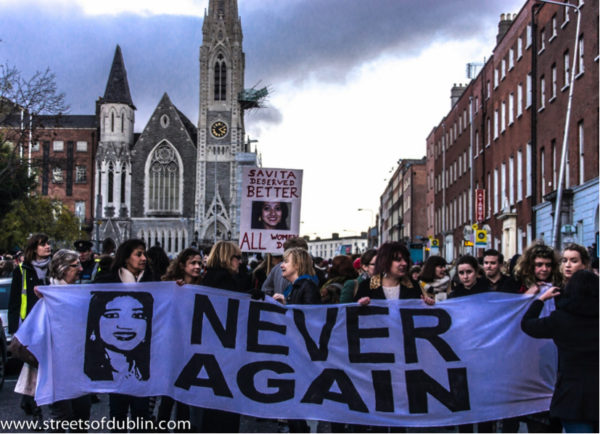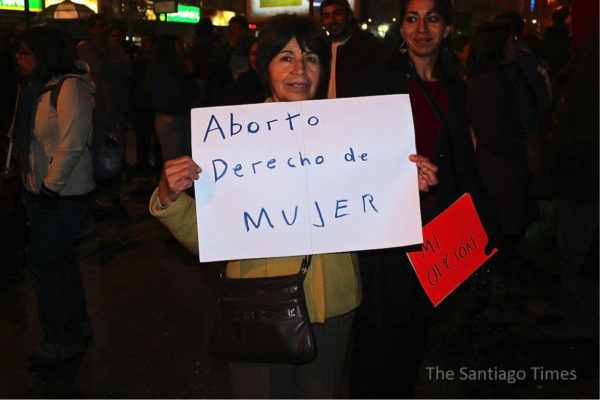Abortion rights in peril: A global look
The case of a teenage rape victim in El Salvador caught international attention and outrage in early July after the girl was handed a 30-year prison sentence for having a stillbirth. Evelyn Beatriz Hernandez Cruz was convicted of “aggravated homicide” for not having sought antenatal care for her baby, a decision the court believed was deliberate.
Hernandez hadn’t realized she was pregnant. She had been raped repeatedly by a gang member as part of a “forced sexual relationship,” the Guardian reported.
But the 19-year-old woman lives in El Salvador, one of a handful of countries that criminalizes abortion without exception—including rape or if the mother’s life is at risk. The country has earned itself notoriety for having one of the harshest abortion laws in the world. Although a bill introduced in October to legalize abortion—if the woman’s life is at risk, if the fetus is unviable, or in cases of rape—is an encouraging sign, the women’s rights movement in El Salvador is still moving far too slowly for women like Hernandez. A vicious fight lies ahead for both Hernandez and the bill that would exonerate her, as they face a pro-life opposition that is both influential and well-funded.
Women around the world continue to struggle not only with draconian laws that deny them ownership of their own bodies, but also the threat of hard-won rights being rolled back. Here, we take a look at some of the places around the world that are playing the long game for abortion reform.
Ireland

Denounced by groups for being “cruel and inhuman,” Irish law prohibits abortion under nearly all circumstances except saving the life of the woman.
One woman, Claire, found this out all too well. An Al-Jazeera article published in March 2016 reported how, when Claire was 20 weeks’ pregnant, her unborn daughter was diagnosed with a fatal form of Patau Syndrome, a genetic disorder associated with intellectual disability and physical abnormalities. Claire was told her baby, who she and her husband named “Alex,” would have no chance of survival. But, because the couple lived in Ireland, the only thing they could do was wait for Alex to die before being induced.
According to the Eighth Amendment, which was passed in 1983, the fetus is an Irish citizen with the same rights as everyone else in the state. Even the presence of fatal fetal abnormalities does not constitute a right to terminate the pregnancy. The UN Human Rights Committee has now twice instructed Ireland to reform its laws on abortion, an action that may finally come in 2018, when the Republic is seeking to hold a constitutional abortion referendum.
An estimated 3,500 Irish women travel to the U.K. each year for abortion care, according to the British Department of Health. Many run the risk of harassment along the way. Just last month, an anti-abortion group announced plans to protest at airports in Cork and Dublin to stop women from getting on planes headed to countries where they would receive abortions.
Sierra Leone
“She died in front of my office door,” Dr. Rowland Taylor—an obstetrician gynecologist at a hospital in Freetown, Sierra Leone—told Al-Jazeera in April 2016, recalling the death of a nursing student after a botched unsafe abortion. “Her head just slumped back in her wheelchair. She was 24 years old.”
Dubbed by some as “the worst place on the planet to be pregnant,” Sierra Leone has one of the highest maternal mortality rates in the world, according to UN groups, with some 10 percent of those maternal deaths resulting from unsafe abortions. The Ebola crisis only exacerbated the issue: As aid funds were diverted to contain the outbreak, funding for family planning shrank. At the height of the crisis, schools also closed, which resulted in some 20,000 teenage girls becoming mothers, according to Save the Children health program officer Marget Tucker. The country’s law, inherited from colonial rule, The English Offences Against the Person Act of 1861, prohibits all abortions—except to save the life of a woman and in cases of physical or mental health—and criminalizes participating parties, driving abortion services underground. The consequences are devastating.
In December 2015, parliament passed the Safe Abortion Act 2015, which would remove the ban and allow women and girls to terminate a pregnancy under any circumstances up to 12 weeks. The law would permit abortion up to 24 weeks in cases of rape, incest, or risk to the fetus or the woman or girl. Yet the bill has twice been rejected by President Ernest Bai Koroma, who succumbed to pressure from religious groups.
The bill was sent back to parliament for revision, but it will take strong political will for it to break the legislative barrier imposed by the country’s religious leaders. Without a robust pro-choice influence over the president, life-saving abortion reform will remain frustratingly out of reach for Sierra Leonean women and girls.
Poland
In October, thousands of Polish women dressed in black protested a legislative proposal to limit abortions to only those in which a woman’s life was in “direct danger.” Under the bill, doctors would face up to five years in prison for performing an abortion.
The protests worked, and the bill was defeated in Polish parliament.
Just weeks later, a new proposal attempted to ban abortions in cases of fetal malformation or when the fetus has no chance of survival. Again, protesters took to streets across the country—and a parliamentary committee rejected the proposal.
Then, in late June, the Polish government signed into law a bill that made emergency contraception a prescription drug. Now, women and girls over the age of 15 must make an appointment with a doctor and receive a prescription to access emergency contraception. Activists have condemned the new law for survivors of rape, especially in rural areas, since the morning-after pill is more effective the sooner it is taken after intercourse.
“In Poland, even if you are a teenage rape victim, you will now have to fight to find a doctor who might, or might not, help you,” said a spokesman for the International Planned Parenthood Federation.
Poland’s health minister has suggested that the morning-after pill induces early abortion, leading critics to believe that the new law is another attempt by the conservative Polish government to restrict abortion access in the country while skirting its obligations to the Council of Europe to ensure that abortion access is available where it is legal. In direct response to this action, Women on Web, a Netherlands-based website that delivers abortion pills to women in countries with restricted access to safe abortion, said it would begin providing all women with free prescriptions from a European doctor.
Chile

Chile joins El Salvador as one of the six countries in the world that ban abortion without exception. (The others are Nicaragua, Malta, the Vatican, and the Dominican Republic.) With limited access to emergency contraception, nearly 200,000 unsafe abortions occur in the country each year. The ban has been in place since 1989—a legacy of Chile’s former military government under General Augusto Pinochet. Before then, abortion had been legal under certain circumstances since 1931.
In January 2015, President Michelle Bachelet introduced the “Tres Causales” reform bill, which would decriminalize abortion in three cases: when a woman’s life is at risk, when a fetus suffers from a fatal abnormality, or in instances of rape or incest. Despite public opinion polls indicating strong favor for reform, and pressure from the U.N. Committee on Economic, Social and Cultural Rights to approve the bill, progress has been painfully slow, with Senate committees reviewing certain articles of the bill for months at a time.
In July, roughly two years after it was first introduced, the bill passed in the Senate, clearing a major hurdle. After a disappointing shortfall of one vote in the Chamber of Deputies a day later, the bill was resurrected recently, and passed both chambers of Congress with an overwhelming majority. The bill is now with Chile’s Constitutional Tribunal for final review.
Dominican Republic
The Dominican Republic is one of the last countries in Latin America—along with El Salvador, Chile, and Nicaragua—to maintain an antiquated, restrictive abortion law. The current criminal code dates back to 1884, criminalizing the procedure with no explicit exceptions. Consequently, an average of more than 90,000 unsafe abortions happen every year, according to the Center for Reproductive Rights.
Recent history illustrates the reluctance of the government to modernize its abortion policy, with a pattern of steps forward followed almost immediately by setbacks. Efforts by President Danilo Medina to decriminalize abortion in certain circumstances have been stalemated since December 2015, when the amended penal code he enacted the year before was declared unconstitutional by the Constitutional Tribunal of the Supreme Court.
In May, against the recommendations of the president, the Senate advanced its own proposed penal code to Congress’s lower house, the Chamber of Deputies, to reinstate a total ban on abortion.
However, in early August, the Chamber rejected the Senate’s proposal, effectively wedging ajar the door to abortion reform in the country. A new vote could be months away, but this latest congressional vote is a major win for activists, as it allows the decriminalization of abortion under Medina’s signed penal code to come into effect. Colectiva Mujer y Salud, a nonprofit advocating for sexual and reproductive rights within the country, celebrated the ruling as “a milestone for those who defend the right to autonomy.”
More articles by Category: Gender-based violence, Health, International, Violence against women
More articles by Tag: Abortion, Sexualized violence, Reproductive rights, Trauma, Gender bias



























